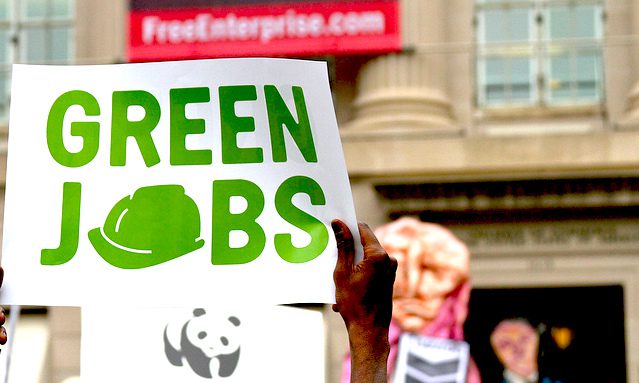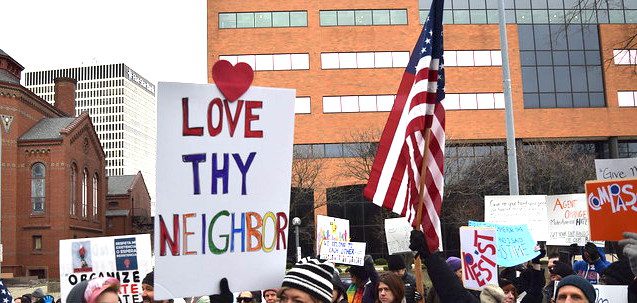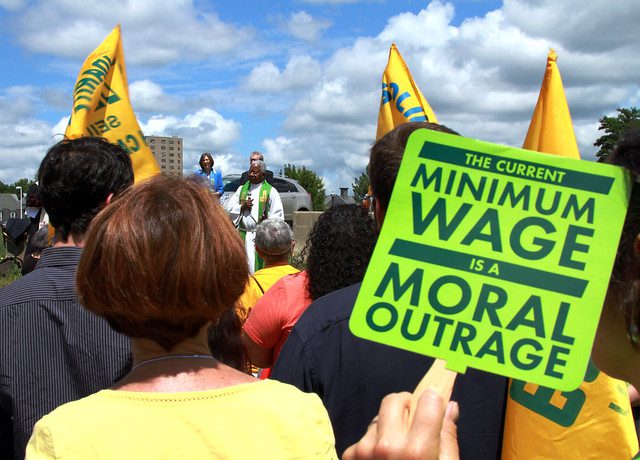
‘Green Jobs’ photo by Linh Do via flickr, CC BY 2.0
Quote of the Week:
“A Green New Deal is first and foremost about justice—prioritizing working people, communities of color and others who bear the brunt of stagnant wages, polluted air and water, and climate impacts. It’s about acting at the speed and scale that equity and science demand. But if opponents want to debate the plan’s straight economic merits, Green New Deal backers should welcome the opportunity. The plan is also about fiscal foresight [and] . . . creating economic opportunities.”—A Green New Deal Is Fiscally Responsible. Climate Inaction Is Not, by Justin Talbot-Zorn, Ben Beachy, and Rhiana Gunn-Wright, in The Guardian
Brad Pitt’s Make It Right housing initiative in New Orleans post-Hurricane Katrina has come under a lot of criticism recently for the failure of several of its houses—or more accurately for its avoidance of dealing with the failure of several of its houses. As journalist Rob Walker, who has looked into the problem, told Common Edge: “It’s fine—and even admirable—to experiment, but if you’re going to say, ‘We’re going to be bold and take risks, experiment, and push the envelope,’ then you are also obligated to say, ‘And we will bear the consequences for what doesn’t work.’”
Meanwhile, up North, Newark native Queen Latifah is attempting to have an effect on affordable housing in her hometown. Her company is an investor in a project that will break ground this summer and will include market-rate multifamily townhomes and a mixed-use building that will contain affordable units.
Facts of the Week. From “The Preservation of Subsidized Housing: What We Know and Need to Know,” by Vincent Reina, for Grounded Solutions Network, published by Lincoln Institute of Land Policy, over the next 10 years:
- Over 455,000 units, or almost 1/4 of the existing units in the LIHTC program, will reach the end of their affordability restriction periods;
- Almost 590,000 units in Section 8 project-based rental assistance (PBRA) programs, representing well over half of the existing units, will be in properties where the owner has the option to renew their subsidy or exit the program; and
- Almost 43,000 of the 360,000 units ever developed in the Section 202 program, and 11,000 of the 400,000 units ever developed in the Section 515 program, will reach the end of their subsidy period.
Still a Food Desert. Dollar Stores have multiplied at an exceedingly fast rate in low-income areas, oftentimes replacing traditional grocery stores (or making it harder for traditional groceries to open and compete), along with access to fresh food, and jobs. A survey and mapping project done by the Institute for Local Self Reliance is finding that the stores may not be just be simply filling a need in low-income areas, but may be exacerbating economic distress in these neighborhoods. The article highlights some legislative action Tulsa, Oklahoma is taking to limit their volume in low-income areas.
Change the Funding Formula: Predominantly white school districts get $23 billion more funding than those that serve mostly students of color. At the core, we know that lower-income school districts and those that serve mostly students of color get less funding and have less support, but the cavernous funding gap is heartbreaking. The disparity is mostly due to property taxes being the primary source of funding for schools, according to the report by EdBuild, a nonprofit that studies how schools are funded.
While we know that a decreasing unemployment rate has not equaled rising wages for the average American worker, The Economic Policy Institute has presented data that paints an even bleaker picture for people concerned about and working to combat wage inequality. One finding is that the wage growth most low- to middle-wage workers have experienced has only made up for what was lost during the Great Recession. Another is that not only has wage inequality persisted, but for certain groups, including low-income men low-income African Americans, the gulf has only widened.
Another Growing Gap: Job seekers live too far from where job opportunities are located, according to an analysis by the Urban Institute. This “spatial mismatch” can lead to high unemployment rates and longer spells of joblessness. The report highlights the Bay Area, where the imbalance is particularly prominent, as well as 15 other metros areas. We know what we can do to lesson this imbalance—improve access to public transportation, and create more affordable housing near transit and jobs.
The Power of Rent Control: There are six states and two cities that are currently considering rent control legislation. If those policies were approved, 12.7 million renter-households would be stabilized, according to a new report, “Our Homes, Our Future.” The report, produced by PolicyLink, the Center for Popular Democracy, and Right To The City Alliance, also indicates that 42 million renter households would be protected from displacement and skyrocketing rents if rent control policies were adopted nationwide. We’ll have more on this report in a future post.





Comments